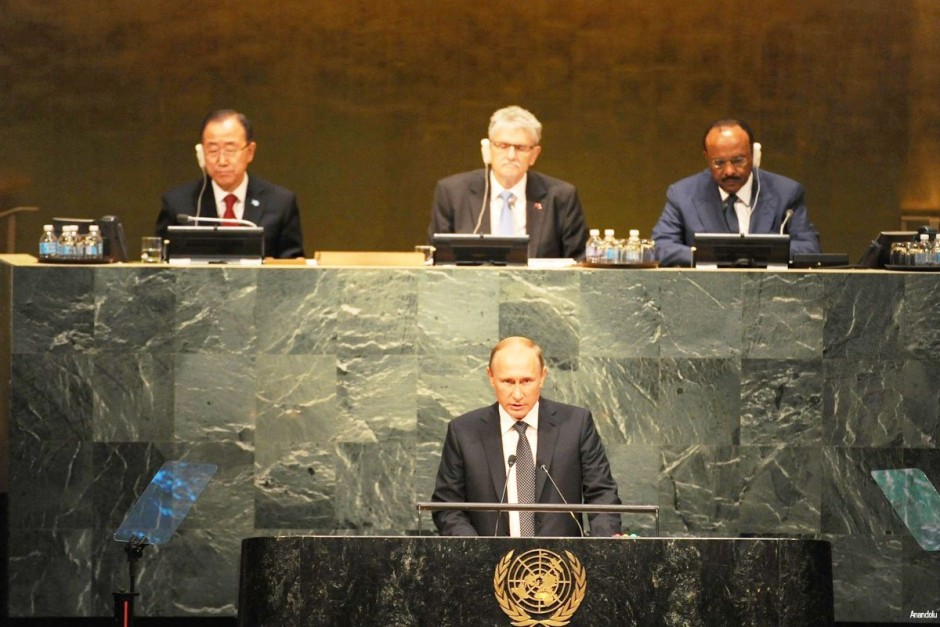Judging by the major speeches delivered at this week’s new session of the United Nations’ General Assembly in New York City, the raging civil war in Syria has displaced the Arab-Israeli conflict as the focal point of interest and concern among delegates.
Syria concentrated the minds of world leaders primarily because the bloodshed there has prompted hundreds of thousand of desperate Syrians to migrate to Europe, creating a refugee crisis of monumental proportions.
With the refugees straining resources in European nations, particularly in Germany, the two super powers, the United States and Russia, clashed over the carnage in Syria.
On September 28, President Barack Obama of the United States and President Vladimir Putin presented dueling speeches at the UN before airing their differences in private, their first face-to-face meeting in about a year.

Their contentious discussion took place against the backdrop of a Russian military buildup in Syria to bolster President Bashar al-Assad, a longtime ally whose army has lost ground to Islamic fundamentalists battling the Syrian regime. By all accounts, Assad — a member of the minority Alawite sect — controls only a quarter of Syria’s land mass, mainly along the Mediterranean coast, in and around Damascus and in the Alawite enclave encompassing the city of Latakia.
More than 200 militias have taken up arms against Assad, a secular nationalist, since this sectarian war broke out in 2011. Assad’s opponents are almost exclusively Sunni Muslims, who comprise the majority of Syria’s heterogeneous population.
Some of his adversaries, supported by the United States and its allies, are moderate nationalists who seek the abolition of Assad’s Baathist Party police state. In the past two and a half years, they have been pushed aside by Islamic extremists from Islamic State, which hopes to create a borderless caliphate in the Middle East, and the Al Nusra Front, which is aligned with Al Qaeda.
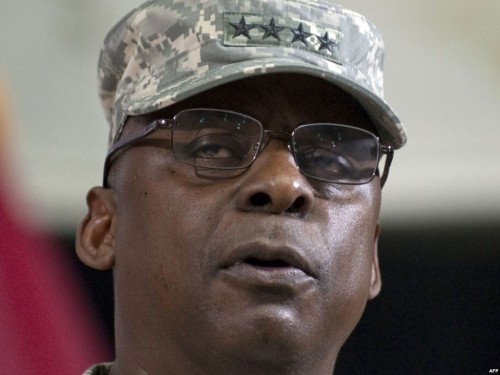
American efforts to train 5,000 moderate Syrian fighters, at a cost of $500 million, have been an abysmal and embarrassing failure, with only four or five such combatants having been trained so far, according to General Lloyd Austin, head of the U.S. Central Command, which oversees U.S. operations in the Middle East.
After four years of endless war which has claimed the lives of 250,000 Syrians and left Syria in smouldering ruins, Islamic State and the Al Nusra Front reign supreme in the nation that once proudly described itself as the “beating heart” of Arab nationalism. In the meantime, 30,000 foreign volunteers from 100 countries have poured into Syria in the last four years to join the swelling ranks of Islamic State.
Having witnessed the demise of a succession of Arab rulers in Tunisia, Egypt, Yemen and Libya since the eruption of the Arab Spring in 2010, Assad has stubbornly held his ground as Syria has been incrementally destroyed in a war of attrition. It’s the worst regional conflict since the civil war in Lebanon, which erupted in 1975 and ended in 1990, and the Iran-Iraq War, which lasted from 1980 to 1988.
Syria, once one of the strongest countries in the Arab world, a standard-bearer of the Palestinian cause and a perennial foe of Israel, has imploded for all intents and purposes.
Assad’s armed forces and ubiquitous web of security agencies have remained true to his leadership, but his survival is due not solely to their loyalty. Russia and Iran, two of his oldest allies, have swung resolutely behind him with political, logistical and military assistance.
Assad has also received significant aid from Hezbollah, the Shiite Lebanese movement aligned with Iran. Hezbollah, which waged a month-long war with Israel in 2006 and has since attacked Israel in a series of skirmishes, has dispatched men and materiel to Syria in a bid to prop up Assad’s regime.
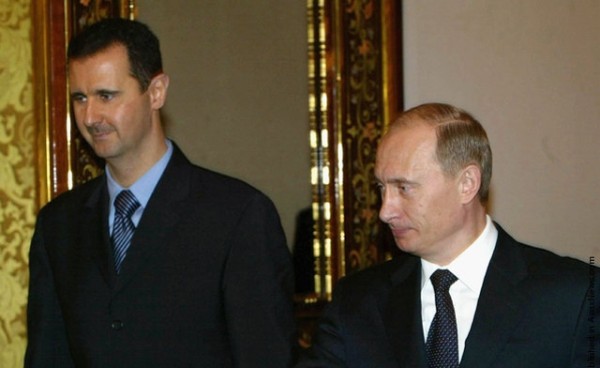
Of late, Russia has reinforced its support for Assad by sending fighter aircraft, helicopter gunships, transport helicopters, anti-aircraft missile batteries and hundreds of Russian advisers and marines to its base in Latakia, in western Syria.
Moscow has also signed an intelligence-sharing agreement with Syria, Iraq and Iran, all Shiite Muslim states, to combat Islamic State, a Sunni organization.
Moscow’s strategic aims are clear: to save the beleaguered Assad regime, to consolidate its already considerable foothold in Syria, to expand its influence in the Middle East, to crush the forces of Islamic radicalism, which threaten Russia as well, and, last but not least, to shift Western attention away from Russia’s intervention in Ukraine.
“We are supporting the government of Syria in the fight against a terrorist aggression,” said Putin on September 15 in a reference to Islamic State and like-minded organizations. “We are offering and will continue to offer it necessary military and technical assistance.”
By Putin’s reckoning, Syria deserves all the help it can get. “It’s obvious that without the Syrian authorities … without the Syrian army fighting Islamic State on the ground, it’s impossible to drive terrorists from this country and from the region as a whole.”
Reiterating his position in a speech to the UN on September 27, Putin called for a “genuinely broad international coalition” to defeat Islamic State. “We think it’s an enormous mistake to refuse to cooperate with the Syrian government and its armed forces who are valiantly fighting terrorism. No one but President Assad’s forces, and Kurdish militia, are truly fighting the Islamic State and other terrorist organizations inside Syria.”
Dismissing calls for Assad’s ouster, Putin urged the international community and moderate Syrian opposition groups to link up with Assad in battling Islamic State.
Assad issued a similar appeal on September 16, claiming that a political solution to Syria’s travails can only be found if his foes join forces with him and focus their energies on defeating Islamic State.
Obama, in his speech to the UN, laid out a completely blueprint.
Branding Assad a tyrant whose brutality had ignited the civil war and fomented the rise of Islamic State in Syria, Obama called for his eventual removal, even if only through a period of “managed transition.”
Further parting ways with the Russians, Obama rejected the notion that “the prewar status quo” can be preserved in Syria.
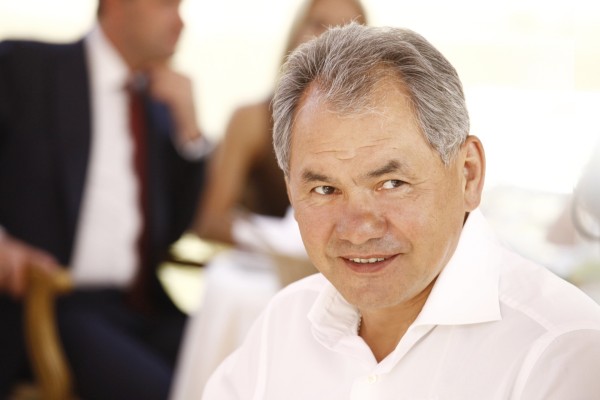
It’s difficult to foresee how the diametrically opposed positions of the United States and Russia on Assad’s future can be reconciled. But lest it be forgotten, Washington and Moscow worked together in 2014 to dismantle Syria’s arsenal of chemical weapons. And two weeks ago, U.S. Secretary of Defence Ashton Carter initiated a dialogue on Syria with his Russian counterpart, Sergei Shoigu.
Carter’s objective was preventative — to forestall an accidental military confrontation between the United States and Russia over Syria. It’s a worrisome possibility because both American and Russian aircraft are now bombing Islamic State bases and convoys in Syria. The United States launched its air campaign last September. Russia’s first air strikes, near the city of Homs, took place on September 30.
On the heels of the Carter/Shoigu talks, Israeli Prime Minister Benjamin Netanyahu, accompanied by Israel’s top general, Gadi Eisenkot, flew to Moscow to discuss Russia’s larger military role in Syria.
Reminding Putin that Iran has supplied Hezbollah with modern weapons through Syria, Netanyahu sought an assurance from the Russian leader that Moscow’s higher military profile in Syria will not affect unacknowledged Israeli bombing raids aimed at blocking Iranian delivery of arms to its Lebanese ally.
“All actions taken by Russia in the region have always been and will be very responsible,” Putin claimed.
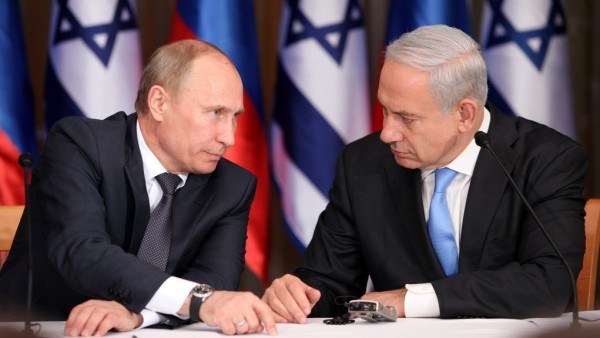
Putin agreed that the flow of arms to Hezbollah should be stopped, but denied that these weapons are Russia-made and cast doubt on Israel’s assertion that Syria and Iran intend to open a new front on the Golan Heights.
Time will tell whether Putin’s disclaimers are sincere.
